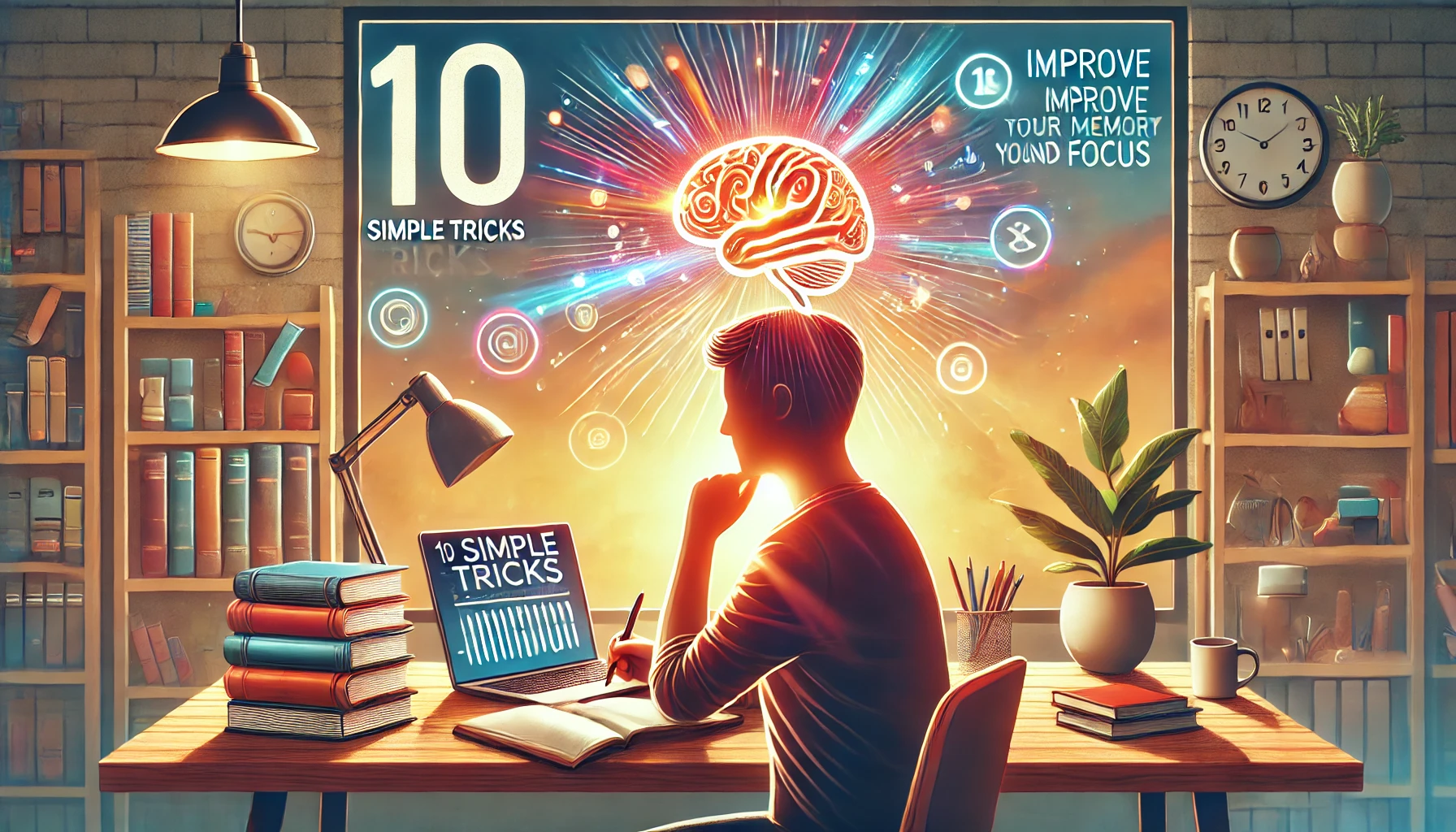In today’s fast-paced world, maintaining sharp memory and laser focus can feel like an uphill battle. With distractions everywhere and an ever-increasing workload, it’s crucial to adopt strategies that can enhance mental clarity. Whether you’re a student preparing for exams, a professional juggling responsibilities, or simply someone aiming to stay sharp, boosting your memory and focus can significantly improve your quality of life.
This blog will explore 10 simple yet effective tricks to improve your memory and focus, backed by science and actionable advice.
1. Prioritize Quality Sleep
Sleep is the foundation of a healthy brain. During deep sleep, your brain consolidates memories and clears out toxins, enhancing cognitive function.
- How to Improve Sleep:
- Stick to a consistent sleep schedule, even on weekends.
- Create a bedtime routine to wind down, such as reading or meditating.
- Limit screen time at least an hour before sleep.
- Why It Matters: Sleep deprivation can lead to forgetfulness and decreased focus. Prioritizing rest allows your brain to recharge and process information effectively.
2. Engage in Regular Physical Activity
Physical exercise isn’t just good for your body—it’s a powerful tool for your brain. Studies have shown that regular physical activity can improve memory and concentration by increasing blood flow to the brain.
- Best Exercises for Brain Health:
- Aerobic exercises like running or cycling.
- Yoga for mindfulness and stress reduction.
- Strength training to enhance mental resilience.
- Scientific Insight: Physical activity promotes the release of brain-derived neurotrophic factor (BDNF), a protein that supports memory and learning.
3. Practice Mindfulness and Meditation
Mindfulness practices have been proven to improve attention and working memory. By staying present, you can train your brain to focus better.
- Steps to Get Started:
- Dedicate 10 minutes daily to mindfulness meditation.
- Use apps like Calm or Headspace for guided sessions.
- Focus on your breath and gently bring your attention back when it wanders.
- Benefits: Meditation reduces stress, sharpens focus, and improves emotional regulation, creating a calmer mind better equipped for learning.
4. Eat a Brain-Boosting Diet
What you eat plays a significant role in cognitive health. Consuming nutrient-rich foods can enhance memory and concentration.
- Top Brain Foods:
- Blueberries: Rich in antioxidants, they delay brain aging.
- Fatty Fish: High in omega-3 fatty acids, essential for brain function.
- Nuts and Seeds: Packed with vitamin E for cognitive protection.
- Leafy Greens: Contain nutrients like vitamin K and lutein that boost brain health.
- Pro Tip: Stay hydrated. Even mild dehydration can impair focus.
5. Harness the Power of Mnemonics
Mnemonics are memory aids that help you recall complex information through patterns, associations, or visualization.
- Examples of Mnemonics:
- Acronyms (e.g., “ROYGBIV” for the colors of the rainbow).
- Rhymes or songs to memorize facts.
- Visual imagery to link concepts.
- Why It Works: Mnemonics simplify information, making it easier for your brain to retrieve.
6. Break Tasks Into Smaller Steps
Cognitive overload can hinder focus. By breaking large tasks into manageable steps, you can stay organized and improve concentration.
- How to Implement:
- Use the Pomodoro Technique: Work for 25 minutes, then take a 5-minute break.
- Set clear, achievable goals for each session.
- Celebrate small wins to maintain motivation.
- Bonus Tip: Use tools like Trello or Notion to organize tasks visually.
7. Learn a New Skill
Engaging in new activities can stimulate your brain, creating new neural connections and improving cognitive flexibility.
- Skill Ideas to Try:
- Learning a musical instrument.
- Picking up a new language.
- Exploring creative hobbies like painting or photography.
- Research Insight: Novel experiences challenge your brain, keeping it sharp and adaptive.
8. Limit Multitasking
Contrary to popular belief, multitasking reduces efficiency and impairs memory. Your brain performs best when it focuses on one task at a time.
- Tips to Avoid Multitasking:
- Use apps like Forest to block distractions.
- Prioritize tasks and tackle them sequentially.
- Create a distraction-free workspace.
- Why It’s Effective: Focusing on a single task improves the depth and quality of your work, enhancing memory retention.
9. Play Brain-Training Games
Cognitive games and puzzles can improve your memory, focus, and problem-solving skills.
- Games to Try:
- Sudoku or crossword puzzles.
- Chess for strategic thinking.
- Apps like Lumosity or Elevate for targeted brain training.
- Scientific Backing: Regular cognitive challenges stimulate neuroplasticity, the brain’s ability to adapt and grow.
10. Build Strong Social Connections
Social interactions are crucial for mental health. Engaging with others can boost mood, reduce stress, and enhance cognitive function.
- Ways to Connect:
- Join community groups or clubs.
- Schedule regular catch-ups with friends or family.
- Volunteer for causes you care about.
- Fact Check: Studies suggest that strong social ties reduce the risk of cognitive decline.
Additional Tips for Better Memory and Focus
- Use Visualization Techniques: Create mental images to associate with facts or ideas.
- Write Things Down: Jotting down notes helps solidify information in your memory.
- Maintain a Healthy Work-Life Balance: Overworking can lead to burnout, which harms memory and focus.
Conclusion
Improving your memory and focus doesn’t require drastic changes. By incorporating these 10 simple tricks into your daily routine, you can enhance your cognitive abilities and lead a more productive life. From prioritizing sleep to adopting mindfulness, each strategy is designed to support your mental well-being.
If you’re looking to dive deeper into the science of brain health, check out this resource from the National Institute on Aging for more insights on maintaining cognitive vitality.
And for more tips on lifestyle changes for better brain health, explore this article from Harvard Health.
